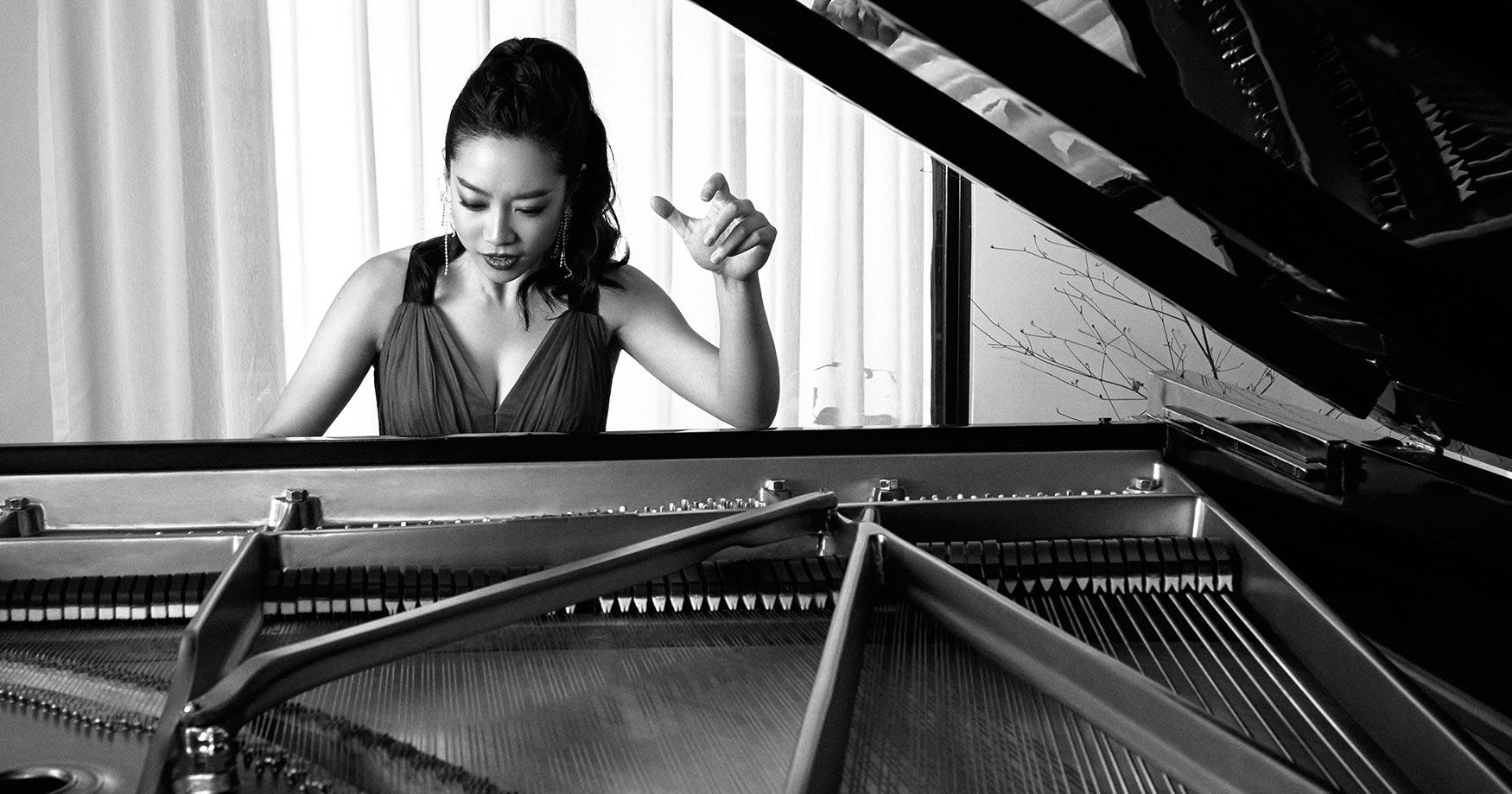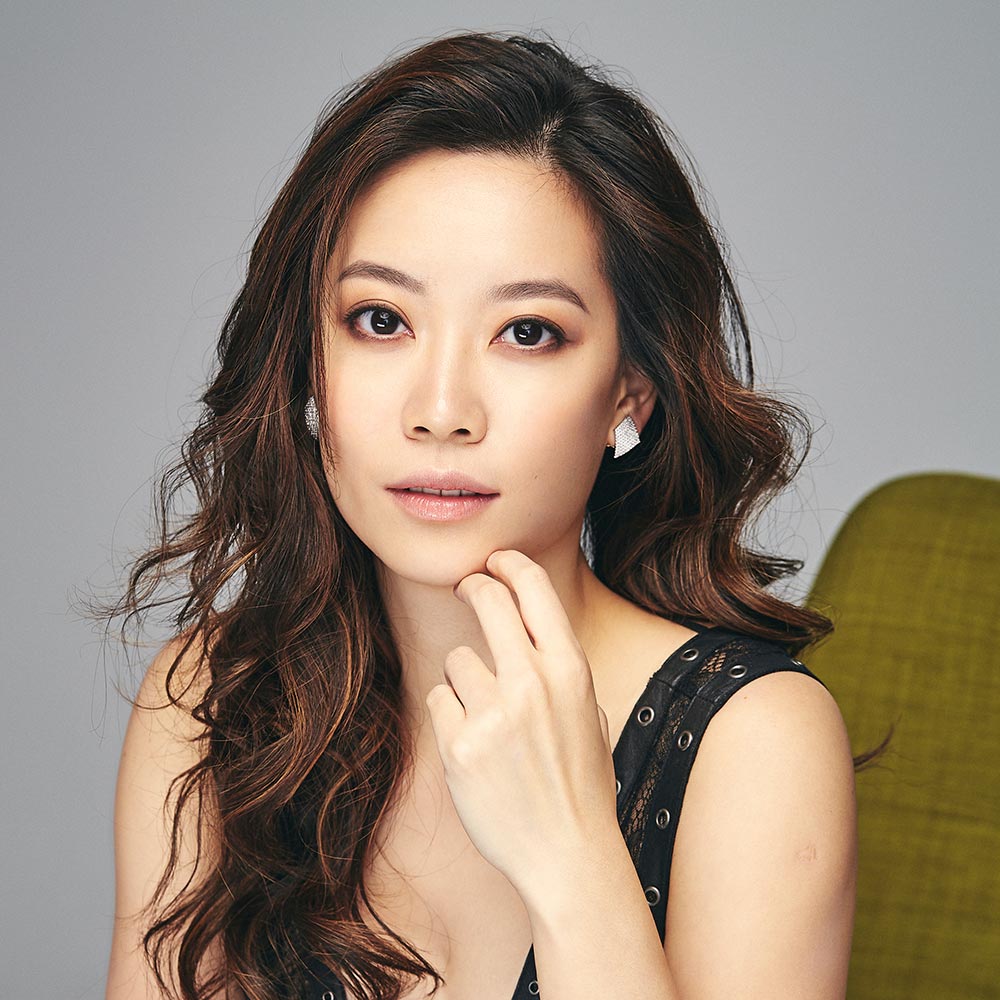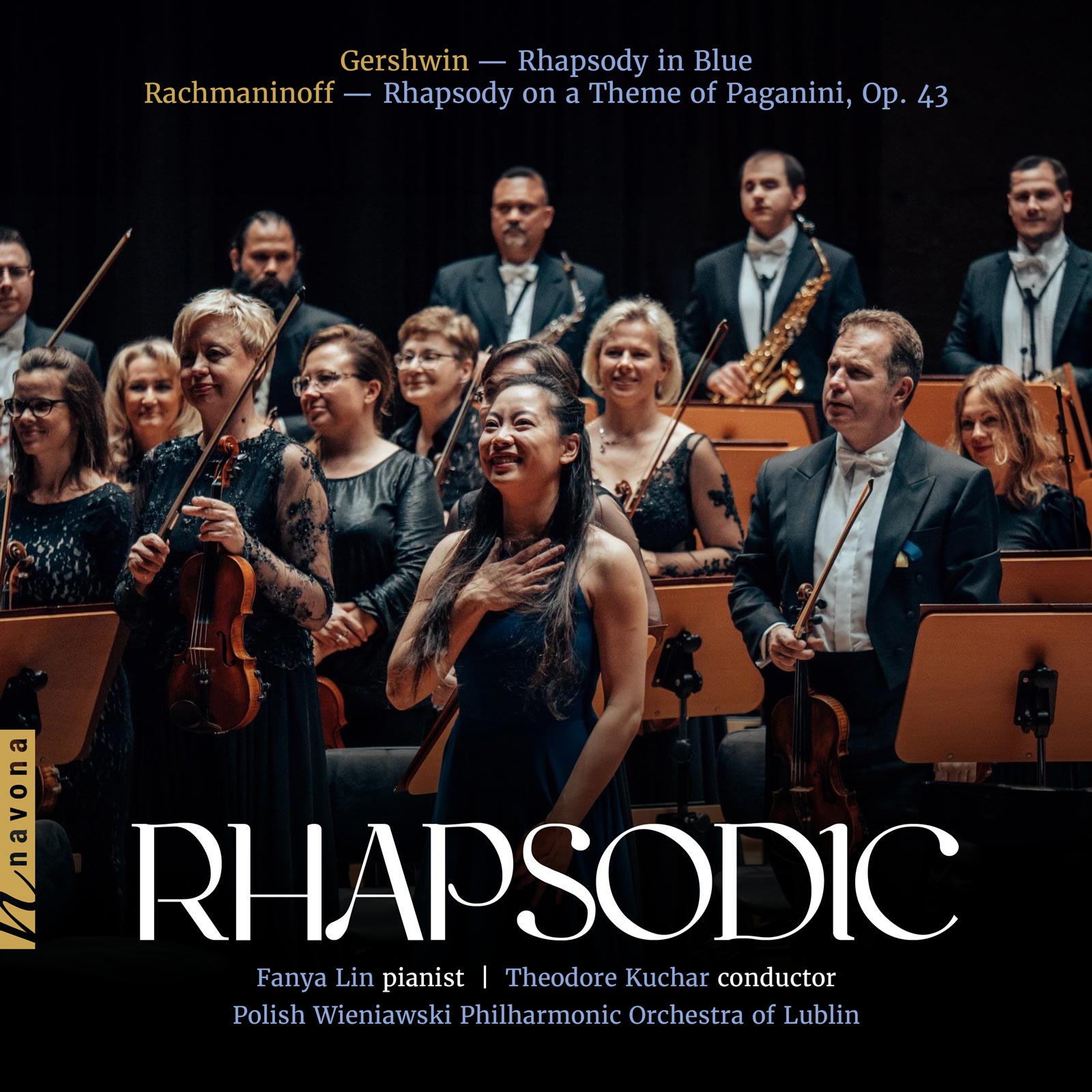
Pianist Fanya Lin’s RHAPSODIC is a masterful exploration of two of the most iconic pieces in piano repertoire. With her deft touch and nuanced interpretation, Lin lends an entirely new dimension to George Gershwin’s Rhapsody in Blue and Rachmaninoff’s Paganini Variations. From the opening notes of Gershwin’s masterpiece, Lin’s playing proves both powerful and sensitive, capturing the complex emotions of the iconic American composer with great vividness.
Today, Fanya is our featured artist in “The Inside Story,” a blog series exploring the inner workings and personalities of our composers and performers. Read on to learn about her musical journey and various athletic pursuits, from Krav Maga to surfing, bouldering, and more…
What were your first musical experiences?
I was born into a musical family where both of my parents were musicians. My mom played the keyboard and my dad played the drums in their rock band. I vividly remember going to a restaurant for dinner at a young age when the live musicians at the restaurant recognized my dad and invited him on stage to perform the set. It was such a fun experience that I’ve since associated music with happiness, joy, fulfillment, honor, and purpose in life. I also grew up listening to my mom improvising the accompaniment of Elton John and Whitney Houston’s songs on her upright piano as I dance around the house or waking up listening to the classical music stations on weekends, so music has always been linked with positive memories in my childhood. While my parents are not professional musicians anymore, they are very supportive of my passion for classical music and my career as a concert pianist.
What musical mentor had the greatest impact on your artistic journey? Is there any wisdom they’ve imparted that still resonates today?
I am extremely fortunate to have amazing mentors throughout my life, who enriched my artistic journey and shaped my musical career. My undergraduate mentor Dr. Yu-Jane Yang and my doctoral degree mentor Professor Lydia Artymiw had the deepest impact on me.
Dr. Yang’s emphasis on tone color, sound production, imagination for sonority, story building, character creation, physical gesture, respect of score, etc. significantly changed how I approach music and the piano. She helped me understand the clarity, conviction, and charisma I need as a performer. I admired her music making so much that I decided to study with her teacher, Professor Lydia Artymiw. Each lesson and studio class with Lydia is like entering a magical realm. The intensity, drama, and emotional turmoil in her playing often moves me to tears, while the everchanging characters, lightness of touch, and intricate shades of colors often leaves me speechless. I still take lessons with Lydia occasionally when I am preparing for new repertoire and draw inspiration from her incredible orchestral sound and imaginative approach towards music.
What are your other passions besides music?
I’ve always considered myself adventurous. I am very curious, and I love learning, so my passion evolves over time. A few years ago, I was intrigued by the relationships between yoga philosophy and the flow state as a musician, so I trained and became a RYT 200 certified yoga teacher in 2021. Currently, I teach an elective course titled “Yoga for Musicians” at the University of Arizona. In 2021, I took a self-defense class and fell in love with Krav Maga. Training in Krav Maga taught me a whole new level of discipline, confidence, perseverance, and resilience I didn’t know existed in me as I prepared for the belt test. I started bouldering in 2022 and competed in the “Old Pueblo Classic” bouldering competition hosted by Rock Solid, a local gym in Tucson. I was so delighted that I won 3rd place in my category. My new passion is surfing. I surfed for the first time in Hawaii in 2010 and had the opportunity to learn surfing seriously for two weeks in Taiwan this year. While I don’t have much access to surf in Tucson, I am excited for the grand opening of Revel Surf’s Cannon Beach in Mesa.
What’s the greatest performance you’ve ever seen, and what made it special?
I’ve always been a huge fan of Martha Argerich. I was a freshman at Weber State University in Utah when my teacher, Dr. Yang, invited me to Argerich’s performance of Ravel’s Piano Concerto in G with the San Francisco Symphony. I flew into San Francisco on a Friday to hear Argerich perform. The nuances, ideas, lyricism, clarity, emotional engagement, and spirituality were so rich and sophisticated in her playing that it changed my understanding of sonority and standard for artistic quality completely. The next morning, I had an early flight back to Utah, just in time to compete in the Utah Music Teachers Association’s Concerto Competition, where I performed Rachmaninoff’s Rhapsody on a Theme of Paganini. This competition became the first piano competition I’ve won after moving to the United States.
How do you prepare for a performance?
When I learn a new repertoire, I usually have a four-step process.
Step one includes all the background checks, reading biographies or researching the composition, recording, and performance practice related to the repertoire, while observing the markings on the score and writing in the fingerings.
Step two is memorization. I use a multi-layered memorization method, focusing on as many senses as possible, including aural, visual, verbal, analytical, and physical aspects of a piece.
Step three is when I bring the repertoire up to speed and fine tune any details remaining.
Step four is when I practice performing. I record myself a lot, as well as performing for my family, friends, students, teachers, and colleagues.
I also have a performance-day routine that I try to follow. It starts with a cup of black tea and 3 to 4 hours of practice, a nutritious brunch, nap, some snacks, yoga, a hot shower, then getting ready for the concert. Once I am all dressed-up with my make-up on, I do a centering meditation before going on stage to optimize my focus and energy. I like having the silence and solitude before a performance to concentrate on what’s to come.
If you weren’t a musician, what would you be doing?
Besides learning all the extreme sports? Maybe becoming a writer. I’ve always loved reading novels, especially the fantasy genre and psychological thrillers. I had an amazing Chinese Literature teacher in middle school who could miraculously turn any boring reading assignments into a fascinating world constructing adventure. She ignited my passion for literature, and I became a fast reader, able to consume hundreds of pages of novels within a few hours. I took non-fiction writing as a college student, then fiction writing during my master’s degree, and screenplay writing during my doctoral degree. Rachmaninoff once said that “the degree of imagination for a creative performer is different than someone who is merely an interpretative artist,” and stresses the importance of color and imagination as a performer through the process of creation. For me, writing serves as the creative outlet I need. My fiction works were featured by Mandarin Daily News multiple times, and my non-fiction article was featured by Crown Magazine, a leading literary magazine in Taiwan. With that said, I think I’d be happy to develop a career as an MMA fighter as well if I weren’t a musician.

Described as a “striking interpreter” who gives a “committed and heartfelt performance” by Musical America and The New York Times, pianist Fanya Lin has entranced audiences worldwide with her charismatic and fiery performances. Lin’s “mesmerizing performance” of Rachmaninoff’s Rhapsody on a Theme of Paganini in the United Kingdom was depicted as “a tornado had touched down through her body and lifted her, feathers fluttering, from the piano stool as she weighed into the keys.” Her orchestral appearances include the Royal Philharmonic Orchestra, Toruń Symphony, Utah Symphony, Savannah Philharmonic, The Jackson Symphony, Mississippi Valley Orchestra, and New Art Symphony, among others.

